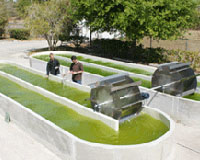The Environmental Impacts Of Algae-Based Biofuel
Jan 27, 2010 - BioFuel Daily
 |
| While the researchers found algae production to have a greater environmental impact than other sources, it remains an attractive source for energy. Algae, which are grown in water, don't compete with food crops grown on land and also tend to have higher energy yields than sources such as corn or switchgrass. |
With many companies investing heavily in algae-based biofuels, researchers from the University of Virginia's Department of Civil and Environmental Engineering have found there are significant environmental hurdles to overcome before fuel production ramps up. They propose using wastewater as a solution to some of these challenges.
These findings come after ExxonMobil invested $600 million last summer and the U.S. Department of Energy announced last week that it is awarding $78 million in stimulus money for research and development of the biofuel.
The U.Va. research, just published in the journal Environmental Science and Technology, demonstrates that algae production consumes more energy, has higher greenhouse gas emissions and uses more water than other biofuel sources, such as switchgrass, canola and corn.
"Given what we know about algae production pilot projects over the past 10 to 15 years, we've found that algae's environmental footprint is larger than other terrestrial crops," said Andres Clarens, an assistant professor in U.Va.'s Civil and Environmental Department and lead author on the paper. Clarens collaborated on the paper with Lisa M. Colosi, also an assistant professor in the Civil and Environmental Engineering Department; Eleazar P. Resurreccion, a graduate student in the department; and Mark A. White, a professor in U.Va.'s McIntire School of Commerce.
As an environmentally sustainable alternative to current algae production methods, the researchers propose situating algae production ponds behind wastewater treatment facilities to capture phosphorous and nitrogen - essential nutrients for growing algae that would otherwise need to be produced from petroleum.
Those same nutrients are discharged to local waterways, damaging the Chesapeake Bay and other water bodies, and current technology to remove them is prohibitively expensive.
While the researchers found algae production to have a greater environmental impact than other sources, it remains an attractive source for energy. Algae, which are grown in water, don't compete with food crops grown on land and also tend to have higher energy yields than sources such as corn or switchgrass.
Additionally, algae's high lipid content makes for efficient refinement to liquid fuels that could be used to power vehicles, according to the research.
"Before we make major
investments in algae production, we should really know the environmental impact of this technology," Clarens said. "If we do decide to move forward with algae as a fuel source, it's important we understand the ways we can produce it with the least impact, and that's where combining production with wastewater treatment operations comes in."
As an example of the importance of completing the environmental life cycle study, Clarens points to the 2008 ethanol boom which created a spike in corn prices worldwide and raised complex ethical issues that could have been avoided by producing separate crops for food and fuel.
"People were investing in ethanol refineries, but then we realized that it takes a lot of petroleum to grow corn and convert it to ethanol," Clarens said. "By the time you get done, you've used almost as much petroleum to make ethanol that you would have if you just put the oil straight into your car."
The research group's plans include conducting demonstration projects for the wastewater production methods. They are also pursuing complementary research on the economic lifecycle of algae compared to other bionenergy feedstocks.



